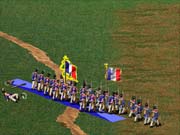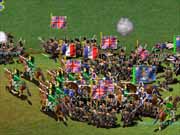Based on the game engine used in both Sid Meier's Gettysburg and its follow-up, Antietam, Waterloo: Napoleon's Last Battle combines real-time strategy with some turn-based combat mechanics to depict the epic battle of 1815. The gameplay is solid enough to warrant the interest of hard-core fans of the genre and the time period, but the game does have some problems, and its graphics engine can be rather choppy and slow even on a well-equipped system.

Developed by BreakAway Games, the same group that created Sid Meier's Antietam, Waterloo is in many ways a faithful update of the Civil War games published by Firaxis. The graphics have been enhanced with 16-bit color, and a variety of new unit formations have been added, but the underlying mechanics are the same as before. You scroll around a nicely detailed depiction of the battlefield, selecting units with a simple mouse click. To move the units, you drag the mouse to a destination and select a formation. Brigades can be moved by issuing orders to their commanding generals, followed again by selecting a formation. Units will move when and where they can but will often be forced to halt and defend themselves if you carelessly move them into the line of fire.
Whether moving or engaged in combat, all units are animated. However, most of the animations comprise only a few frames, so movement can seem jerky at times. This is especially true of the cavalry units, whose movement pace is a bit too fast for the animation that accompanies it.
In light of the vibrant and often spectacular uniforms worn during the Napoleonic Era, Waterloo includes more than 60 different uniform types. Zoom in on any unit on the battlefield, and you'll see a respectable level of detail in the various uniforms depicted. Also, key figures, such as Napoleon himself and the Duke of Wellington, are represented by unique sprites that are fairly easy to pick out in a crowd.
The game includes more than 30 historical and hypothetical scenarios, ranging from small-scale meeting engagements to the full-blown (and quite lengthy) Battle of Waterloo. As in the Civil War games, you can generate random battles of varying sizes. A new feature in Waterloo also lets you custom-design new scenarios: You can determine key objectives, troops to be included, and the marching orders for all the soldiers involved.
New gameplay features include the ability to occupy buildings on the battlefield. This lets key historic landmarks, like the farmhouse of La Haye Sainte, play an important role in the game. Also, Waterloo offers several new unit formations, such as the infantry square (which is critical for defending against cavalry attacks), the four-deep line, and the attack column.
The cavalry units themselves are worthy to note, as they play a much more important role in this game (and this period) than they did in the Firaxis games. Cavalry attacks can completely devastate a poorly arranged defensive line, and the computer often uses these attacks with disturbing effectiveness.
Waterloo does have some problems, mostly in that the game's performance leaves a lot to be desired. Despite the somewhat dated graphics engine, the gameplay can bog down alarmingly when several units are on the screen at the same time. Scrolling around the battlefield causes some visual stuttering as well and can be quite frustrating when you're trying to issue critical movement orders.

The game is also inconsistent in the way in which it determines possession of battlefield objectives. Often, the computer will be given credit for holding a key ridge or hill, even when your troops are arranged all over the spot and his are still cowering at the foot of the slope. In one instance, a single French cavalry unit claimed a major objective area, despite being surrounded at close range by no less than eight British infantry squares.
Nevertheless, Waterloo should have a long life home on many wargamers' hard drives. The gameplay is generally quite good, even with the graphic slowdowns and the other occasional problems. After all, the underlying game design was already top-notch in Waterloo's predecessors, and the improvements added for Waterloo are impressive. So even though the game engine is definitely showing its age, hard-core strategy game players should still find a lot to like about Waterloo.